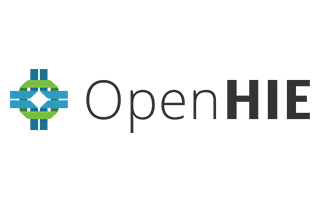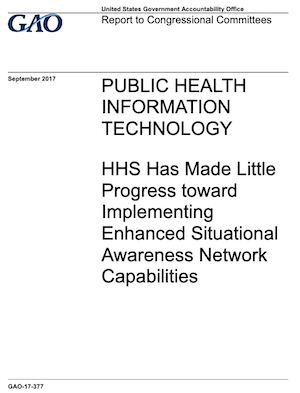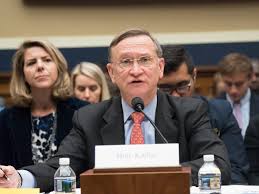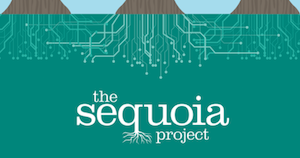 In February 2022 the Sequoia Project released its Emergency Preparedness Information Workgroup’s Pandemic Response Insights and Recommendations. This workgroup was convened in the fall of 2020 at the height of the pandemic with a diverse set of stakeholders from all areas of the healthcare system. The resulting short report is worth a read as it offers concise analysis and recommendations. The first task the workgroup undertook was to conduct a SWOT (strengths, weaknesses, opportunities, threats) analysis focused on pandemic response. There was a strong public health focus that resulted from this activity: “During a declared emergency, and during non-emergency times as well, public health should be viewed as a collaborator and partner with equal access to shared data” (p. 6).
In February 2022 the Sequoia Project released its Emergency Preparedness Information Workgroup’s Pandemic Response Insights and Recommendations. This workgroup was convened in the fall of 2020 at the height of the pandemic with a diverse set of stakeholders from all areas of the healthcare system. The resulting short report is worth a read as it offers concise analysis and recommendations. The first task the workgroup undertook was to conduct a SWOT (strengths, weaknesses, opportunities, threats) analysis focused on pandemic response. There was a strong public health focus that resulted from this activity: “During a declared emergency, and during non-emergency times as well, public health should be viewed as a collaborator and partner with equal access to shared data” (p. 6).
Emergency Preparedness and Response (EPR)
See the following -
Open Source Solutions For Public Health Case Reporting and COVID-19
 The United States is continuing its slow emergence from a nation-wide shut down imposed to slow down the spread of COVID-19. Most states have started to reopen, with bars, restaurants, and many workplaces starting to fill. As people begin to spend more time together again, it is critically important that public health agencies do everything they can to help prevent further spread of the infection and continue to monitor the level of infection within the population. Data is an important tool that public health has to understand what is going on in the country. Years of limited government investment and neglect of current systems has limited public health's ability to meet the challenges of managing both localized outbreaks and pandemics.
The United States is continuing its slow emergence from a nation-wide shut down imposed to slow down the spread of COVID-19. Most states have started to reopen, with bars, restaurants, and many workplaces starting to fill. As people begin to spend more time together again, it is critically important that public health agencies do everything they can to help prevent further spread of the infection and continue to monitor the level of infection within the population. Data is an important tool that public health has to understand what is going on in the country. Years of limited government investment and neglect of current systems has limited public health's ability to meet the challenges of managing both localized outbreaks and pandemics.
- Login to post comments
OpenHIE
 Open Health Information Exchange (OpenHIE) is a global community working to help resource-constrained environments better leverage their healthcare data. We work to improve the health of the underserved through open, collaborative development and support of country driven, large scale health information sharing architectures. Read More »
Open Health Information Exchange (OpenHIE) is a global community working to help resource-constrained environments better leverage their healthcare data. We work to improve the health of the underserved through open, collaborative development and support of country driven, large scale health information sharing architectures. Read More »
- Login to post comments
Overdue Outbreak Detection System Leaves Patchwork Defense
 The U.S. should have had a nationwide network to monitor for the next viral outbreak or biological threat a decade ago. It still doesn't. Instead, public health leaders make do with a patchwork system while waiting for the Department of Health and Human Services races to get its integrated network in service by a new 2023 congressional deadline. Until that nationwide monitoring system is in place, the U.S. runs the risk that a biological threat like a disease outbreak will take hold before it's noticed. "The risk is that we don't have the level of surveillance that we need. The risk is that there are things basically flying under the radar," said Helen Boucher, an infectious diseases clinician at Tufts Medical Center in Boston and director of the university's Center for Integrated Management of Antimicrobial Resistance.
The U.S. should have had a nationwide network to monitor for the next viral outbreak or biological threat a decade ago. It still doesn't. Instead, public health leaders make do with a patchwork system while waiting for the Department of Health and Human Services races to get its integrated network in service by a new 2023 congressional deadline. Until that nationwide monitoring system is in place, the U.S. runs the risk that a biological threat like a disease outbreak will take hold before it's noticed. "The risk is that we don't have the level of surveillance that we need. The risk is that there are things basically flying under the radar," said Helen Boucher, an infectious diseases clinician at Tufts Medical Center in Boston and director of the university's Center for Integrated Management of Antimicrobial Resistance.
- Login to post comments
Pandemic and all-hazards preparedness, response law emboldens U.S. disaster recovery efforts
 The Pandemic and All-Hazards Preparedness and Advancing (PAHPA) Innovation Act, S. 1379, became law on Monday with the president's signature, prompting accolades from national stakeholders, company executives and federal lawmakers. The far-reaching law ensures the United States will be better prepared to respond to a wide range of public health emergencies, whether man-made or occurring through a natural disaster or infectious disease. Overall, the law aims to bolster the nation's health security strategy, strengthen the country's emergency response workforce, prioritize a threat-based approach, and increase communication across the advanced research and development of medical countermeasures (MCMs), among numerous provisions contained in the law.
The Pandemic and All-Hazards Preparedness and Advancing (PAHPA) Innovation Act, S. 1379, became law on Monday with the president's signature, prompting accolades from national stakeholders, company executives and federal lawmakers. The far-reaching law ensures the United States will be better prepared to respond to a wide range of public health emergencies, whether man-made or occurring through a natural disaster or infectious disease. Overall, the law aims to bolster the nation's health security strategy, strengthen the country's emergency response workforce, prioritize a threat-based approach, and increase communication across the advanced research and development of medical countermeasures (MCMs), among numerous provisions contained in the law.
- Login to post comments
Pandemics Are the Mother of Invention
 Many believe that the Allies won WWII in large part because of how industry in the U.S. geared up to produce fantastic amounts of weapons and other war materials. It took some time for businesses to retool and get production lines flowing, during which the Axis powers made frightening advances, but once they did it was only a matter of time until the Allies would prevail. Similarly, COVID-19 is making scary inroads around the world, while businesses are still gearing up to produce the number of ventilators, personal protective equipment (PPE), tests, and other badly needed supplies. COVID-19 is currently outnumbering these efforts, but eventually we'll get the necessary equipment in the needed amounts. Eventually. What intrigues me, though, is how people are innovating, inventing new solutions to the shortages we face. I want to highlight a few of these:
Many believe that the Allies won WWII in large part because of how industry in the U.S. geared up to produce fantastic amounts of weapons and other war materials. It took some time for businesses to retool and get production lines flowing, during which the Axis powers made frightening advances, but once they did it was only a matter of time until the Allies would prevail. Similarly, COVID-19 is making scary inroads around the world, while businesses are still gearing up to produce the number of ventilators, personal protective equipment (PPE), tests, and other badly needed supplies. COVID-19 is currently outnumbering these efforts, but eventually we'll get the necessary equipment in the needed amounts. Eventually. What intrigues me, though, is how people are innovating, inventing new solutions to the shortages we face. I want to highlight a few of these:
- Login to post comments
Resilience Is An Opportunity For Early Bipartisan Success
 In the past year Mr. Chuck Chaitovitz, Vice President of Environmental Affairs and Sustainability for the U.S. Chamber of Commerce, has written two very important and insightful articles advocating a national resiliency agenda...I am adding an expanded perspective of resilience and perhaps drive a broader dialogue. I commend the Chamber for realizing the import of resilience in our economic and business considerations (e.g., general continuity, infrastructure, insurance). I have been advocating resilience for several decades and we need more discourse to move resilience from words to action.
In the past year Mr. Chuck Chaitovitz, Vice President of Environmental Affairs and Sustainability for the U.S. Chamber of Commerce, has written two very important and insightful articles advocating a national resiliency agenda...I am adding an expanded perspective of resilience and perhaps drive a broader dialogue. I commend the Chamber for realizing the import of resilience in our economic and business considerations (e.g., general continuity, infrastructure, insurance). I have been advocating resilience for several decades and we need more discourse to move resilience from words to action.
- Login to post comments
Resilience Must Be Blind to Catalyst - Part II
 If this is the first time you are reading something from me, let me introduce you to a phrase I coined in the early 2000s: "resilience (and continuity) is blind to the catalyst." My oft-repeated comment was to present an alternative to the emergency management foundations that were creeping into the continuity lexicon, whereby contingency planning is typically done with a "commensurate with the hazard" or "capabilities-based" approach. Resilience is and must be viewed with a much higher level of consideration…and NOT limited to specific hazards or capabilities. As I most certainly just ruffled feathers of some of my dearest and most deeply respected emergency management professionals, let me explain.
If this is the first time you are reading something from me, let me introduce you to a phrase I coined in the early 2000s: "resilience (and continuity) is blind to the catalyst." My oft-repeated comment was to present an alternative to the emergency management foundations that were creeping into the continuity lexicon, whereby contingency planning is typically done with a "commensurate with the hazard" or "capabilities-based" approach. Resilience is and must be viewed with a much higher level of consideration…and NOT limited to specific hazards or capabilities. As I most certainly just ruffled feathers of some of my dearest and most deeply respected emergency management professionals, let me explain.
- Login to post comments
Rock Around The Resilience Wheel - Continuity of Operations Through Disruptive Change
 As 2020 comes to a close we are still faced with myriad issues pertaining to public health, elections, economic duress and recovery, unemployment, and living under persistent, pendular change. Resilience has become a popular buzzword to get through these times but is utilized to mean very different things to people looking through very different lenses. Diverse definitions are great but at some point, at some higher and comprehensive perspective, a bow must be put around a common resilience baseline. In layman’s terms, resilience is getting through disruptions and change with some foresight and planning. Resilience matters regardless of the lens you are viewing it through. Covenant Park has coined several catchphrases over our several decades of resilience, risk, continuity, emergency management, security, and national and international planning and execution. Some of those phrases include:
As 2020 comes to a close we are still faced with myriad issues pertaining to public health, elections, economic duress and recovery, unemployment, and living under persistent, pendular change. Resilience has become a popular buzzword to get through these times but is utilized to mean very different things to people looking through very different lenses. Diverse definitions are great but at some point, at some higher and comprehensive perspective, a bow must be put around a common resilience baseline. In layman’s terms, resilience is getting through disruptions and change with some foresight and planning. Resilience matters regardless of the lens you are viewing it through. Covenant Park has coined several catchphrases over our several decades of resilience, risk, continuity, emergency management, security, and national and international planning and execution. Some of those phrases include:
- Login to post comments
Sure Strategies for Improving Health and Education: 2020 and Beyond
 Our paths cross as we enter a new decade and consider the next ten years can lead to marked improvements in healthcare delivery - something sorely needed but doable. To that end, we've identified three key developments that can and should be implemented. These are not the only needed improvements and avenues to be pursued; that would take a book or a longer article. So, we've focused on what are, for us, three of the most innovative possibilities. One added word: some of the three innovations or aspects of them may strike readers as fanciful or imaginary or over-the-proverbial-top. But, the speed with which technology is changing, the pressing need for solutions and our capacities to consider new paradigms for solving old problems are converging.
Our paths cross as we enter a new decade and consider the next ten years can lead to marked improvements in healthcare delivery - something sorely needed but doable. To that end, we've identified three key developments that can and should be implemented. These are not the only needed improvements and avenues to be pursued; that would take a book or a longer article. So, we've focused on what are, for us, three of the most innovative possibilities. One added word: some of the three innovations or aspects of them may strike readers as fanciful or imaginary or over-the-proverbial-top. But, the speed with which technology is changing, the pressing need for solutions and our capacities to consider new paradigms for solving old problems are converging.
- Login to post comments
The Need for Speed - It's Time to Act!
 As a society we also need to get moving on the population level as well - and the sooner the better! In his fascinating genomic epidemiology detective work Trevor Bedford conducted based on the COVID-19 research he and his team had done in the Bedford lab in Seattle WA, he concluded that the narrow testing that was done in the Seattle area in the early days of the Coronavirus spread allowed the virus to spread faster. In contrast, the Coronavirus testing-blitz in South Korea appears to keep the death rate lower than it could be. It's time to test! The FDA gave high-tech labs the green light to operate tests before receiving any agency review or authorization and both Quest Diagnostics and LabCorp already announced that they have test in the market. But according to CDC, as of March 8 there were only 1,707 tests performed in the US vs. 189,236 in South Korea.
As a society we also need to get moving on the population level as well - and the sooner the better! In his fascinating genomic epidemiology detective work Trevor Bedford conducted based on the COVID-19 research he and his team had done in the Bedford lab in Seattle WA, he concluded that the narrow testing that was done in the Seattle area in the early days of the Coronavirus spread allowed the virus to spread faster. In contrast, the Coronavirus testing-blitz in South Korea appears to keep the death rate lower than it could be. It's time to test! The FDA gave high-tech labs the green light to operate tests before receiving any agency review or authorization and both Quest Diagnostics and LabCorp already announced that they have test in the market. But according to CDC, as of March 8 there were only 1,707 tests performed in the US vs. 189,236 in South Korea.
- Login to post comments
The Sequoia Project Releases a Useful Workgroup Report on Information and Pandemic Response
- Login to post comments
The Sequoia Project’s Emergency Preparedness Information Workgroup Publishes Health IT Pandemic Response Planning Recommendations - The Sequoia Project
 The Sequoia Project’s Emergency Preparedness Information Workgroup (EPIW) today published Pandemic Response Insights and Recommendations, a free whitepaper for local, state, and federal emergency preparedness and public health officials and their partners. The workgroup, consisting of emergency preparedness, response, and public health experts, convened over several months to discuss gaps in current solutions. The workgroup recommended ways to make information more readily available to support a more robust and coordinated response to future emergencies.
The Sequoia Project’s Emergency Preparedness Information Workgroup (EPIW) today published Pandemic Response Insights and Recommendations, a free whitepaper for local, state, and federal emergency preparedness and public health officials and their partners. The workgroup, consisting of emergency preparedness, response, and public health experts, convened over several months to discuss gaps in current solutions. The workgroup recommended ways to make information more readily available to support a more robust and coordinated response to future emergencies.
- Login to post comments
The World Knows an Apocalyptic Pandemic Is Coming
 A new independent report compiled at the request of the United Nations secretary-general warns that there is a "very real threat" of a pandemic sweeping the planet, killing up to 80 million people. A deadly pathogen, spread airborne around the world, the report says, could wipe out almost 5 percent of the global economy. And we're not ready. The ominous analysis was compiled by an independent panel, the Global Preparedness Monitoring Board (GPMB), which was assembled last year in response to a request from the office of the U.N. secretary-general, and convened jointly by the World Bank and World Health Organization (WHO). Co-chaired by the former WHO head and former Norwegian Prime Minister Gro Harlem Brundtland and the head of the international Red Cross, Elhadj As Sy, the GPMB commissioned expert studies and issued a scathing attack on the political, financial, and logistical state of pandemic preparedness affairs.
A new independent report compiled at the request of the United Nations secretary-general warns that there is a "very real threat" of a pandemic sweeping the planet, killing up to 80 million people. A deadly pathogen, spread airborne around the world, the report says, could wipe out almost 5 percent of the global economy. And we're not ready. The ominous analysis was compiled by an independent panel, the Global Preparedness Monitoring Board (GPMB), which was assembled last year in response to a request from the office of the U.N. secretary-general, and convened jointly by the World Bank and World Health Organization (WHO). Co-chaired by the former WHO head and former Norwegian Prime Minister Gro Harlem Brundtland and the head of the international Red Cross, Elhadj As Sy, the GPMB commissioned expert studies and issued a scathing attack on the political, financial, and logistical state of pandemic preparedness affairs.
- Login to post comments
Upgrading the PULSE Emergency Response Tool to a Community Edition
 Seven years ago the Office of the National Coordinator for Health Information Technology (ONC) began work on the Patient Unified Lookup System for Emergencies (PULSE). PULSE is an effort to create national resilience by improving first responder access to patient electronic health information they need to provide services and ensure public health during disasters, including public health emergencies. Recently, ONC launched a new, code-only technical solution called PULSE-Community Edition (PULSE Community) that builds on the original PULSE code. PULSE Community enables first responders and other response personnel (e.g., epidemiologists, emergency medical services, and health care volunteers) to securely access vital health information they need during emergencies and disasters from connected health care organizations.
Seven years ago the Office of the National Coordinator for Health Information Technology (ONC) began work on the Patient Unified Lookup System for Emergencies (PULSE). PULSE is an effort to create national resilience by improving first responder access to patient electronic health information they need to provide services and ensure public health during disasters, including public health emergencies. Recently, ONC launched a new, code-only technical solution called PULSE-Community Edition (PULSE Community) that builds on the original PULSE code. PULSE Community enables first responders and other response personnel (e.g., epidemiologists, emergency medical services, and health care volunteers) to securely access vital health information they need during emergencies and disasters from connected health care organizations.
- Login to post comments
US Senate Releases Draft Future Pandemic Preparedness Plan - Asks for Feedback
 On June 10, 2020 the US Senate released a white paper titled "Preparing for the Next Pandemic" under the signature of Senator Lamar Alexander of Tennessee. The white paper has five recommendations to address future pandemics based on lessons learned from COVID-19 and the past 20 years of pandemic planning. "The five recommendations...along with a series of questions at the end of this white paper, are intended to elicit recommendations that Congress can consider and act on this year," Senator Alexander said in a statement, adding that "I am inviting comments, responses, and any additional recommendations for the Senate Committee on Health, Education, Labor and Pensions to consider. This feedback will be shared with my colleagues, both Democrat and Republican." This feedback from the public will be accepted until June 26, 2020... Read More »
On June 10, 2020 the US Senate released a white paper titled "Preparing for the Next Pandemic" under the signature of Senator Lamar Alexander of Tennessee. The white paper has five recommendations to address future pandemics based on lessons learned from COVID-19 and the past 20 years of pandemic planning. "The five recommendations...along with a series of questions at the end of this white paper, are intended to elicit recommendations that Congress can consider and act on this year," Senator Alexander said in a statement, adding that "I am inviting comments, responses, and any additional recommendations for the Senate Committee on Health, Education, Labor and Pensions to consider. This feedback will be shared with my colleagues, both Democrat and Republican." This feedback from the public will be accepted until June 26, 2020... Read More »
- Login to post comments